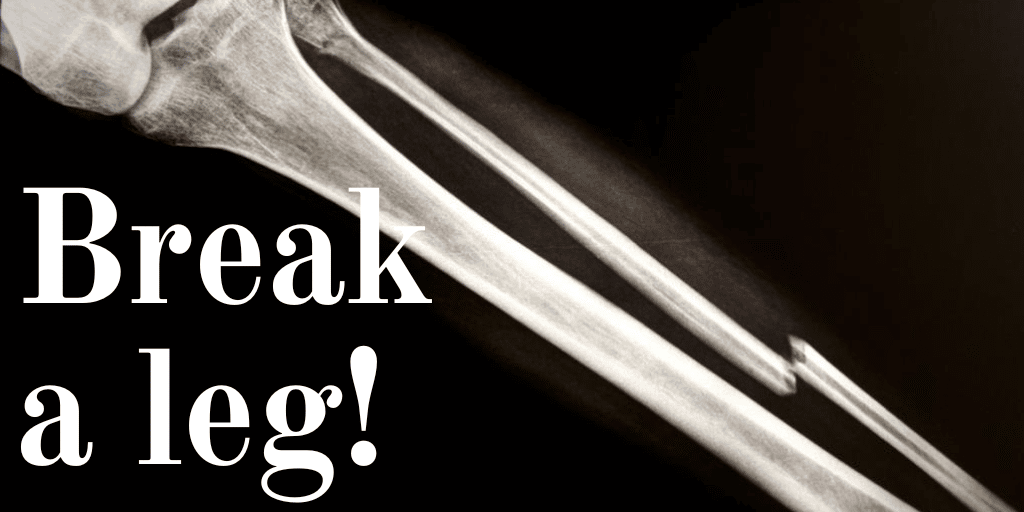“Break a leg” is an idiom theatre people use as an expression to wish actors good luck for their performances and auditions.
Origin of Break a leg
This is one of the most difficult of all idioms to trace back to its origin and is therefore known as a “dead metaphor.” However, there are plenty of theories about how it came to be an expression of support for acting performances and the best that can be done is to take your pick of them.
Many idioms are derived from a superstition of some kind
In the case of “break a leg,” the Irish nationalist writer, Robert Wilson Lynd published an article, “A Defence of Superstition”, in the 1 October 1921 edition of The New Statesman. He asserted that in horse racing wishing a man good luck was unlucky and you should therefore say something insulting as a way of wishing him luck – such as “may you break a leg.” The idea that wishing someone good luck is in fact unlucky may be a forgotten superstition, he claimed, and that the idiom, used in horse racing may have been transferred to the theatre.
Some other theories of the origin of the idiom “break a leg”
- In the First World War German aviators wished each other good luck and safe return with the words hals-und beinbruch (break a leg). The term has Yiddish origins. This theory of the origin of “break a leg” could be explained by German-speaking Jewish immigrants entering the American entertainment industry after the War.
- One of the earliest published examples in writing specifically with reference to a theatre context comes from American writer Edna Ferber’s autobiography A Peculiar Treasure, 1939, in which she writes about the fascination in the theatre of “all the understudies sitting in the back row politely wishing the various principals would break a leg.”
- During a performance of Shakespeare’s Richard III the famous 18th-century actor David Garrick became so entranced in the performance that he was supposedly unaware of a literal fracture in his leg.
- Various folk-theories suggest that Ancient Greek theatrical audiences either stomped their literal legs or banged chair legs to express applause.
- In the early days of theater, this is where ensemble actors were queued to perform. If actors were not performing, they had to stay behind the “leg line,” which also meant they wouldn’t get paid. If you were to tell the actor to “break a leg,” you were wishing them the opportunity to perform and get paid by breaking the leg line.
- One popular theory derives the phrase from the assassination of Abraham Lincoln in 1865 during which the assassin, actor John Wilkes Booth claimed in his diary that he broke his leg leaping to the stage of Ford’s Theatre after murdering the president. The fact that actors did not start wishing each other to “break a leg” until as early as the 1920s (more than 50 years later) makes this an unlikely source.

Theatrical phrase: “Break a leg”
Other superstitions among theatre people
Saying “good luck” isn’t the only superstition in the theatre. Other common superstitions include:
- Whistling in the theatre brings bad luck, so don’t do that.
- Saying the word “Macbeth” in the theatre will curse the production. You never mention the word “Macbeth” in the theatre because of the curse. Even those preparing and performing the play don’t dare use the “M” word. They always refer to Macbeth as “The Scottish play.”
- The last person in the theatre must leave the “ghost light” in the middle of the stage on.
“Break a leg” as book titles
Lise Friedman, writer about ballet, has written one about acting. In Break a Leg she teaches young actors everything they need to know about stagecraft, acting and other aspects of performances.
Jenny Landreth has written the story of amateur dramatics in Britain in her book, Break a Leg. It is a mixture of memoir, social history, interviews, and her own manifesto. She displays a vibrant world that is a crucial part of our culture.
Common synonyms for “break a leg”
You don’t need to say “break a leg” to wish actors good luck. All expressions of good luck are acceptable. Some of them are:
-
Good luck
-
Best of luck
-
Godspeed
-
All the best
-
Blow them away




Leave a Reply
Want to join the discussion?Feel free to contribute!